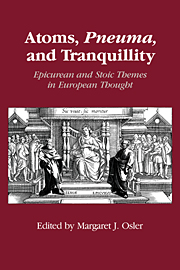Book contents
- Frontmatter
- Contents
- List of contributors
- Acknowledgments
- Introduction
- 1 Ethics and logic in Stoicism
- 2 Medieval connectives, Hellenistic connections: the strange case of propositional logic
- 3 Stoic psychotherapy in the Middle Ages and Renaissance: Petrarch's De remediis
- 4 Alonso de Cartagena and John Calvin as interpreters of Seneca's De clementia
- 5 The Epicurean in Lorenzo Valla's On Pleasure
- 6 Seneca's role in popularizing Epicurus in the sixteenth century
- 7 Stoic contributions to early modern science
- 8 Fortune, fate, and divination: Gassendi's voluntarist theology and the baptism of Epicureanism
- 9 Epicureanism and the creation of a privatist ethic in early seventeenth-century France
- 10 Robert Boyle on Epicurean atheism and atomism
- 11 Stoic and Epicurean doctrines in Newton's system of the world
- 12 Locke, Willis, and the seventeenth-century Epicurean soul
- 13 The Epicurean new way of ideas: Gassendi, Locke, and Berkeley
- 14 The Stoic legacy in the early Scottish Enlightenment
- Index
12 - Locke, Willis, and the seventeenth-century Epicurean soul
Published online by Cambridge University Press: 13 November 2009
- Frontmatter
- Contents
- List of contributors
- Acknowledgments
- Introduction
- 1 Ethics and logic in Stoicism
- 2 Medieval connectives, Hellenistic connections: the strange case of propositional logic
- 3 Stoic psychotherapy in the Middle Ages and Renaissance: Petrarch's De remediis
- 4 Alonso de Cartagena and John Calvin as interpreters of Seneca's De clementia
- 5 The Epicurean in Lorenzo Valla's On Pleasure
- 6 Seneca's role in popularizing Epicurus in the sixteenth century
- 7 Stoic contributions to early modern science
- 8 Fortune, fate, and divination: Gassendi's voluntarist theology and the baptism of Epicureanism
- 9 Epicureanism and the creation of a privatist ethic in early seventeenth-century France
- 10 Robert Boyle on Epicurean atheism and atomism
- 11 Stoic and Epicurean doctrines in Newton's system of the world
- 12 Locke, Willis, and the seventeenth-century Epicurean soul
- 13 The Epicurean new way of ideas: Gassendi, Locke, and Berkeley
- 14 The Stoic legacy in the early Scottish Enlightenment
- Index
Summary
In recent years, historians of early modern thought have raised questions concerning the relation of the philosophy of John Locke to the seventeenth-century Epicurean revival instituted by Pierre Gassendi. While many have seen a strong element of Cartesianism in Locke's thought, some of these historians have argued that the main thrust of his philosophy should be understood in the context of this seventeenth-century Epicureanism. One of the most central, and at the same time puzzling concepts in Locke's Essay Concerning Human Understanding is the concept of soul. While Locke never gave a definitive account of the soul, he did present two hypotheses relating to the “essence” of the soul which were important in contemporary disputes and later philosophical developments. In this chapter I shall suggest that these hypotheses represent Locke's own modifications of a seventeenth-century Epicurean account of the soul. Moreover, I shall argue that two major themes concerning the soul in the Essay have roots in this philosophy.
The best-known of Locke's hypotheses was put forward in Book 4 of the Essay. Throughout much of the Essay Locke wrote about the soul from a Cartesian perspective – apparently the perspective of much of his audience. For example, in the chapter of the Essay in which he discussed personal identity, Locke wrote that he was “taking, as we ordinarily now do, … the Soul of a Man, for an immaterial Substance, independent from Matter.” As such it is conceivable that it can be united to different bodies at different times.
- Type
- Chapter
- Information
- Atoms, Pneuma, and TranquillityEpicurean and Stoic Themes in European Thought, pp. 239 - 258Publisher: Cambridge University PressPrint publication year: 1991
- 18
- Cited by

